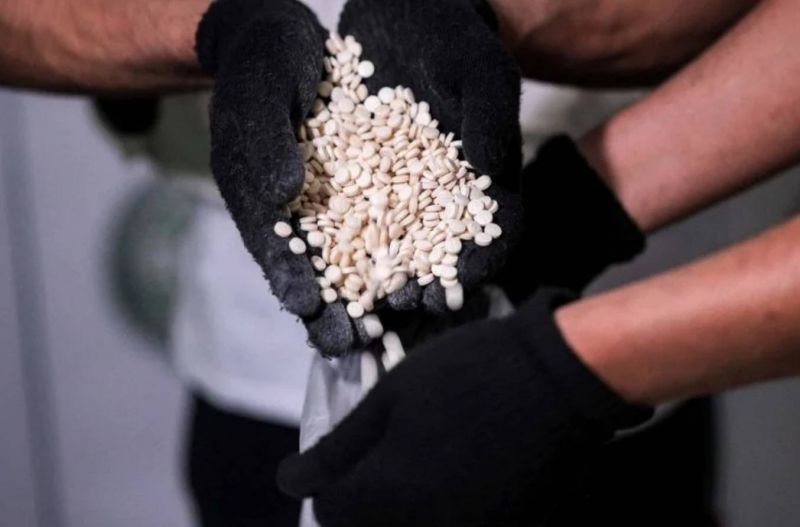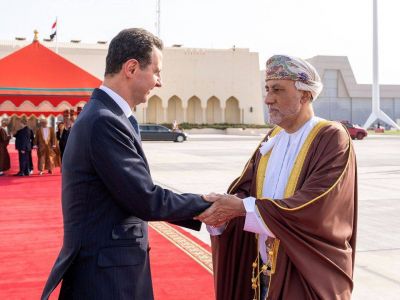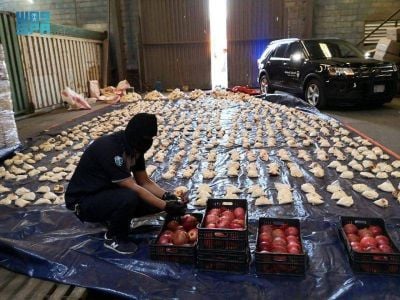
A bag of Captagon seized in Jeddah, Saudi Arabia. (Credit: AFP)
In a bid to send a message to the Gulf states determined to normalize ties with the Syrian government, the United States and the United Kingdom have imposed sanctions against key players in the drug trade, including members of Syrian President Bashar al-Assad’s family.
Concerned about the accelerated pace of normalization between Damascus and its volatile Arab allies, notably Saudi Arabia and the United Arab Emirates, Washington appears set on using the fight against captagon trafficking as an additional pressure tool to prevent Syria from returning to the regional diplomatic arena.
The Syrian regime is the biggest captagon exporter.
However, Syria’s neighboring states, which have been heavily impacted by drug trafficking, appear to be taking a different approach. According to Aron Lund, a researcher at the Century Foundation, “The more these governments are affected by the situation in Syria, the more reasons they see for renewing ties with Damascus.”
What we know
On March 28, the US and UK announced sanctions targeting several key players in the production and export of captagon. The Treasury Department’s Office of Foreign Assets Control (OFAC) took direct aim at the “Syrian regime and its allies” who allow it to “continue to repress the Syrian people with illicit drug trafficking revenues and other financial means.”
The OFAC targeted Lebanese drug traffickers Nouh Zeaiter and Hassan Dekko, who “maintain links with Hezbollah in facilitating the export of captagon.” Additionally, two cousins of Bashar al-Assad and businessman Khaled Kaddour, who is close to Maher al-Assad, the Syrian president’s brother, were also targeted by the sanctions.
Despite the sanctions, Saudi Arabia is reportedly preparing to invite Assad to the upcoming Arab League summit in May, according to Reuters.
Background
Listed as a psychotropic drug by the World Health Organization in 1986, captagon — dubbed the “jihadist drug” for its use by members of the Islamic State group (Daesh) during the war in Syria — is primarily consumed in Saudi Arabia as a recreational drug.
The production and trafficking of this synthetic drug composed of fenethylline has become, over the course of the war in Syria, a lifeline for the Syrian regime, which has been bombarded with sanctions for the atrocities it committed during the war that that left nearly half a million people dead since 2011.
Besides constituting a regional public health challenge, this highly addictive drug is also a security issue for Syria’s neighbors. Jordan’s army for example, intercepted 361 attempts to smuggle captagon pills across its border in 2021, resulting in the deaths of several Jordanian border guards.
According to analysts, Syria has become a true narco-state, responsible for 80 percent of captagon supply, which constitutes at least three times its national budget, with annual profits estimated at $10 billion in 2022.
In a press statement, the British authorities speak of profits amounting to $57 billion annually, which is “the equivalent of three times the Mexican cartels’ drug trade.” However, this figure is considered “absurd” by Lund, who believes that drug trafficking is “an important business” that allows “people close to the regime to make huge profits.”
These sanctions represent the first concrete application of the law “Countering Assad’s Proliferation Trafficking And Garnering Of Narcotics,” also known as the “Captagon Act,” which was promulgated on Dec.23, 2022, by US President Joe Biden.
Several former senior US officials and civil society members involved in the Syrian issue, including former CIA director John McLaughlin, sent a letter on March 27 to Biden and Secretary of State Antony Blinken, urging them to take stronger action to curb the normalization of diplomatic relations between Gulf countries and the Syrian regime.
Following the deadly Feb. 6 earthquake, Syrian President Bashar al-Assad eagerly engaged in “earthquake diplomacy,” which warmed his relations with many Arab countries, including the UAE, Egypt, Bahrain and Oman, after 12 years of regional isolation.
On March 18, Assad was welcomed in Abu Dhabi by his Emirati counterpart, Mohammad bin Zayed. It was his first visit to an Arab country since the war in Syria began.
The Kuwaiti newspaper al-Jarida reported that Maher al-Assad, the head of the Fourth Division (which plays a key role in drug trafficking) recently visited Riyadh to receive Saudi preconditions for restoring relations with Damascus, including the suppression of captagon smuggling.
The implementation of these sanctions marks the first significant step in the US strategy under the “Captagon Act.” The US State Department expected to announce progress and next steps in early summer. The European Union may also join the United Kingdom in implementing sanctions to curb the production of the drug.
However, Middle East Directions Programme researcher Ayman Aldassouky suggests that the sanctions will have little impact on drug trafficking, as it has become a global network that involves various formal and informal actors at the local, national and regional levels that will be difficult to dismantle.
“Additionally, the sanctions target only key players in the trafficking, while sparing others who work behind the scenes,” Aldassouky said.
According to Lund, the Syrian regime plans to use neighboring countries’ security concerns as leverage to renew ties with them. Lund said that while the Gulf countries might in reality doubt the regime’s promises to combat drug trafficking, they have perhaps started to reconsider the effectiveness of their refusal to engage with Assad .
As a gesture of goodwill to Riyadh, the Syrian regime has announced that it has captured several boats loaded with captagon destined for the Gulf. Aldassouky believes that the Syrian regime could assist in dismantling some aspects of the captagon trade without fully halting it, using this as a bargaining chip in negotiations with Gulf monarchies.
Aldassouky suggested that along with sanctions, combatting captagon trafficking necessitates a comprehensive approach involving economic, social and political strategies.
This article was originally published in French in L'Orient-Le Jour. Translation by Sahar Ghoussoub.

